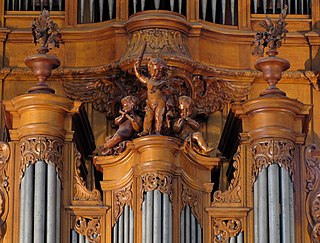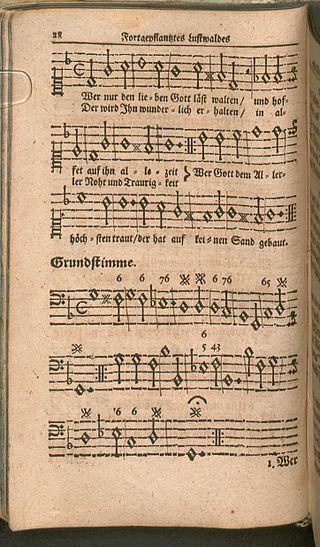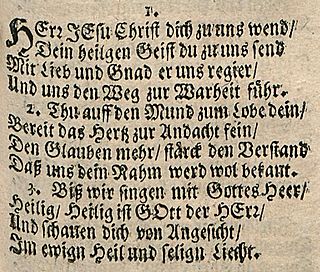Related Research Articles
Johann Tobias Krebs was a German organist and composer, today best remembered as the father of Johann Ludwig Krebs, one of Bach's most accomplished pupils.
The Bach-Werke-Verzeichnis is a catalogue of compositions by Johann Sebastian Bach. It was first published in 1950, edited by Wolfgang Schmieder. The catalogue's second edition appeared in 1990. An abbreviated version of that second edition, known as BWV2a, was published in 1998.

The Toccata and Fugue in D minor, BWV 565, is a composition for organ by, according to the oldest sources, German composer Johann Sebastian Bach and is one of the most widely recognisable works in the organ repertoire. Although the date of its origin is unknown, scholars have suggested between 1704 and the 1740s. The piece opens with a toccata section followed by a fugue that ends in a coda, and is largely typical of the north German organ school of the Baroque era.
Karl Richter was a German conductor, choirmaster, organist, and harpsichordist.

The Eight Short Preludes and Fugues, BWV 553–560, are a collection of works for keyboard and pedal formerly attributed to Johann Sebastian Bach. They are now believed to have been composed by one of Bach's pupils, possibly Johann Tobias Krebs or his son Johann Ludwig Krebs, or by the Bohemian composer Johann Caspar Ferdinand Fischer.

Sechs Chorale von verschiedener Art: auf einer Orgel mit 2 Clavieren und Pedal vorzuspielen, commonly known as the Schübler Chorales, BWV 645–650, is a set of chorale preludes composed by Johann Sebastian Bach. Johann Georg Schübler, after whom the collection came to be named, published it in 1747 or before August 1748, in Zella St. Blasii. At least five preludes of the compilation are transcribed from movements in Bach's church cantatas, mostly chorale cantatas he had composed around two decades earlier.
Johann Ludwig Krebs was a German Baroque musician and composer for the pipe organ, harpsichord, other instruments and orchestras. His output also included chamber music, choral works and concertos.

Johann Sebastian Bach was a German composer and musician of the late Baroque period. He is known for his prolific output across a variety of instruments and forms, including orchestral music such as the Brandenburg Concertos; solo instrumental works such as the cello suites and sonatas and partitas for solo violin; keyboard works such as the Goldberg Variations and The Well-Tempered Clavier; organ works such as the Schubler Chorales and the Toccata and Fugue in D minor; and choral works such as the St Matthew Passion and the Mass in B minor. Since the 19th century Bach Revival, he has been generally regarded as one of the greatest composers in the history of Western music.

Wo Gott der Herr nicht bei uns hält is a chorale fantasia for organ composed by Johann Sebastian Bach in the early 18th century, likely between 1705 and 1710. The Zahn 4441a hymn tune for Justus Jonas's 1524 hymn "Wo Gott der Herr nicht bei uns hält", a paraphrase of Psalm 124, is the basis of the composition.

"Wer nur den lieben Gott läßt walten" is a 1641 hymn by Georg Neumark, who also composed the melody for it. It has seven verses and deals with the Christian putting their trust in God. Its author referred to it as a "Trostlied" or song of consolation and it first appeared in his Fortgepflantzer musikalisch-poetischer Lustwald. It also appeared in Johann Crüger's 1672 Praxis pietatis melica and in the first part of Johann Anastasius Freylinghausen's 1704 Geistreiches Gesangbuch. It has inspired musical settings, and is part of current German hymnals, both Protestant and Catholic.

"Heut triumphieret Gottes Sohn" is a Lutheran hymn for Easter. Kaspar Stolzhagen published the hymn in 1592, and its setting by Bartholomäus Gesius was published in 1601. The hymn was adopted in several hymnals, including the Evangelisches Gesangbuch. Composers such as Johann Sebastian Bach based compositions on its hymn tune.

The BWV Anh., is a list of lost, doubtful, and spurious compositions by, or once attributed to, Johann Sebastian Bach.

"Herr Jesu Christ, dich zu uns wend" is a Lutheran hymn from the 17th century. Its hymn tune, Zahn No. 624, was adopted in several compositions. It was translated into English and is part of modern hymnals, both Protestant and Catholic.

In the period following Johann Sebastian Bach's death in 1750, apart from the publication of The Art of Fugue in the early 1750s, the only further publications prior to the 1790s were the settings of Bach's four-part chorales. In 1758 Friedrich Wilhelm Marpurg was the first to start preparing a published edition of Bach's four-part chorales, but in 1763 was prevented by royal duties. C. P. E. Bach, who owned the original manuscripts, then set about the same task, producing two volumes in 1765 and 1769. Dissatisfied with his publisher Friedrich Wilhelm Birnstiel, he surrendered the manuscript rights in 1771 to Johann Kirnberger and his patron Princess Anna Amalia of Prussia. From 1777 onwards, Kirnberger unsuccessfully made requests to Birnstiel and a new publisher, Johann Gottlob Immanuel Breitkopf, to publish the chorales. Following Kirnberger's death in 1783, C.P.E. Bach approached Breitkopf, who published them in four volumes between 1784 and 1787.

Daniel Vetter was an organist and composer of the German Baroque era.
References
- ↑ Tittel 1966, pp. 114–123.
- ↑ Dürr 1987.
- ↑ Friedrich 2009, p. 12
- ↑ "Sanctus, F BWV Anh. 27 / Anh. III 167→; Krebs‑WV 104". Bach Digital . Leipzig: Bach Archive; et al. 2019-05-21.
- ↑ "Prelude, C BWV 567; Krebs‑WV 401". Bach Digital . Leipzig: Bach Archive; et al. 2019-02-14.
- 1 2 3 4 Weinberger, Breitkopf & Härtel, 1985.
- ↑ Weinberger 2001-2007.
- ↑ "Fugue, F# BWV Anh. 97 / Anh. III 181→; Krebs‑WV 409/2". Bach Digital . Leipzig: Bach Archive; et al. 2019-05-21.
- ↑ "Herr Jesu Christ, dich zu uns wend BWV Anh. 172; Emans 97; Krebs‑WV 524". Bach Digital . Leipzig: Bach Archive; et al. 2017-09-20.
- ↑ Friedrich 2009, p. 183